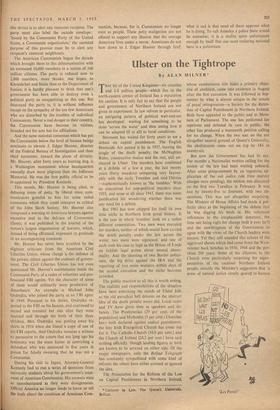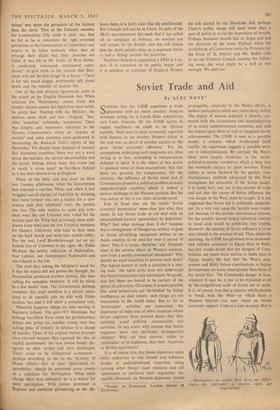Ulster on the Tightrope
By ALAN MILNER* rrHAT bit of the United Kingdom—six counties I and 1.4 million people—which lies in the north-eastern corner of Ireland has a reputation for caution. It is only fair to say that the people and government of Northern Ireland are not given to experiment. In law reform in particular, an intriguing pattern of political wait-and-see has developed: waiting for something to be done 'across the water' and then seeing how it can be adapted (if at all) to local conditions.
Stormont has waited for forty years to see a debate on capital punishment. The English Homicide Act passed it by in 1957, leaving the jungle of the death penalty, the McNaghten Rules, constructive malice and the rest, still un- cleared in Ulster. The murders have continued at a dribble of a few a year, the last twenty years (forty murders) comparing very favour- ably with the early Twenties and mid-Thirties —euphemistically known as 'the troubles.' With no executions for non-political murders since 1933, and none at all since 1943, there was some justification for wondering whether there was any need for a debate.
But 1961 has now chipped for itself its own little niche in Northern Irish penal history. It is the year in which 'troubles' took on a rather different connotation. Two men were executed for murders, neither of which would have carried the death penalty under the law across the water; two more were reprieved; and one of each took his case as high as the House of Lords on ticklish legal points about mental abnor- mality. Add the shooting of two Border police- men, the big drive against the IRA and the reporting of two more murders within days of the second execution and the niche becomes crowded.
The public reaction to all this is worth noting. The realities and responsibilities of the situation have been exercising the minds of Ulster folk as the old parochial hall debates on the abstract idea of the death penalty never did. Local radio and TV have given time to speakers and de- baters. The Presbyterian (29 per cent. of the population) and Methodist (5 per cent.) Churches have both declared against capital punishment; the tiny Irish Evangelical Church has come out for it. The Catholic Church (34.9 per cent.) and the Church of Ireland (24.2 per cent.) have said nothing officially, though leading figures in both are known to be arrayed on either side. Of the major newspapers, only the Belfast Telegraph has constantly sympathised with some kind of reform; the others have either scorned or ignored the idea.
The Association for the Reform of the Law on Capital Punishment in Northern Ireland, * Lecturer in Law, The Queen's University, Belfast. whose cumbersome title hides a primary objec- tive of abolition, came into existence in August after the first execution. It was followed in Sep- tember by what is almost unique in the annals of penal retrogression—a Society for the Reten- tion of Capital Punishment in Northern Ireland. Both have appealed to the public and to Mem- bers of Parliament. The one has petitioned for reprieves and debated its case in public; the other has produced a mammoth petition calling for no change. When the two met on the not altogether neutral ground of Queen's University, the abolitionists came out on top by 184 to twenty-six.
But now the Government has had its say. For months a Nationalist motion calling for the review of the law had been waiting unheard. After some postponement by an ingenious ap- plication of the sub judice rule (two murder charges were pending), the motion was discussed on the first two Tuesdays in February. It was lost by twenty-five to fourteen, with two ab- stentions. This was not altogether surprising. The Minister of Home Affairs had made it per- fectly clear at the beginning of the debate that he was digging his heels in. His vehement references to the irreplaceable deterrent, the time not being right for change (will it ever be?) and the unwillingness of the Government to agree with the views of the Church leaders were sincere. Yet they still sounded like echoes of the aggrieved shouts which had come from the West- minster back benches in 1956, 1948 and the pre- vious 200 years. Some of the allusions to the Church were particularly surprising for repre- sentatives of the cautious Northern Ireland people, notably the Minister's suggestion that 'a sense of natural justice closely geared to human
`Les Parasr
values' was more the perquisite of the layman than the cleric. That of the Unionist member for Londonderry City made it clear, too, that so far as he is concerned the right reverend gentlemen in the Convocation of Canterbury can expect to be taken seriously when they so arrange their aflairs that their churches are fuller. It was left to Mr. Little, of West Down, 'a confirmed, convinced, unashamed reten- tionist,' to give birth to the remark that Stor- mont will not let him forget in a hurry—`There is far too much sloppy, sentimental talk about death and the sanctity of human life. . .
One of the rare all-party agreements came in the attack on the English Homicide Act. When criticism for Westminster comes from this usually reticent source the legislation must surely be pretty bad. Starting with the Minister, the epithets came thick and fast--'illogical,' hor- rible,"senseless,"untenable,"anomalous.' There was lengthy and impressive reference_ to the Gowers Commission's views on 'degrees of murder' and some members even graduated to mentioning the Research Unit's report of last December. Yet despite these displays of unusual (for Stormont) erudition, there was not a word about the suicides, the mental abnormalities and the family killings which make this crime just as much `a crime apart' in Northern Ireland as it has been shown to be in England.
When all has been said and done on these two Tuesday afternoons, when the Government had imposed a one-line Whip, and when it had wriggled out of charges of bad faith by claiming that mere 'review' was not a matter for a con- science vote (but 'abolition' was), the motion was lost. The only matters to cause any com- ment were the one Unionist who voted for the motion (and the Whip had previously been with- drawn from him) and the two Unionist members for Queen's University who kept to their seats on the back bench and went into neither lobby. For the rest, Lord Brookeborough led an un- broken line of Unionists to the right; Mr. Eddie McAteer the motley collection of Nationalists, four Labour, one Independent Nationalist and one Liberal to the left.
The next day, taking the Minister's word for it that the source did not poison the thought, the Nationalists produced another motion, this time calling for complete abolition. It will be taken in a few weeks' time. The Government, perhaps confident that total abolition is a phrase calcu- lated to sit uneasily side by side with Ulster caution, has said it will allow a conscience vote.
Whatever happens, things are now moving in Northern Ireland. The post-1957 Homicide Act lethargy has lifted. Even while the parliamentary debate was going on, another young man was raising pleas of insanity in defence to a charge of murder. Three of his original twelve jurymen were excused because they opposed the idea of capital punishment; the new twelve finally dis- agreed on their verdict and were discharged. There seems to be widespread acceptance— perhaps stretching as far as the Ministry of Home Affairs—that at least `diminished re- sponsibility' should be examined more closely as a substitute for McNaghten. What other change there may ultimately be is a matter for mere speculation. With review promised in England and abolition glimmering in the dis- tance there, it is fairly clear that the abolitionists' first triumph will not be in Ulster. In spite of the IRA's announcement this week that it has called off its campaign of violence, an anxious eye will remain on the Border, and this will ensure that the death penalty stays as a supposed threat t.) and a 'fitting' penalty for terrorists.
Northern Ireland is appointing a PRO in Lon- don. It is conscious of its public image and it is sensitive to criticism. If England finishes the job started by the Homicide Act, perhaps Ulster's public image will need more than a spot of polish to avoid the impression of tarnish. Perhaps Stormont should lick its finger and feel the direction of the wind. Perhaps when the Archbishop of Canterbury visits the Province for the Feast of St. Patrick and Mr. Butler calls in on the Unionist Council meeting the follow- ing week, the wind might be a puff or two stronger. We shall see.



































 Previous page
Previous page